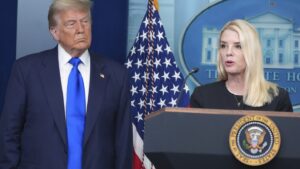The Dictatorship
What Congress should ask Alex Acosta about Jeffrey Epstein
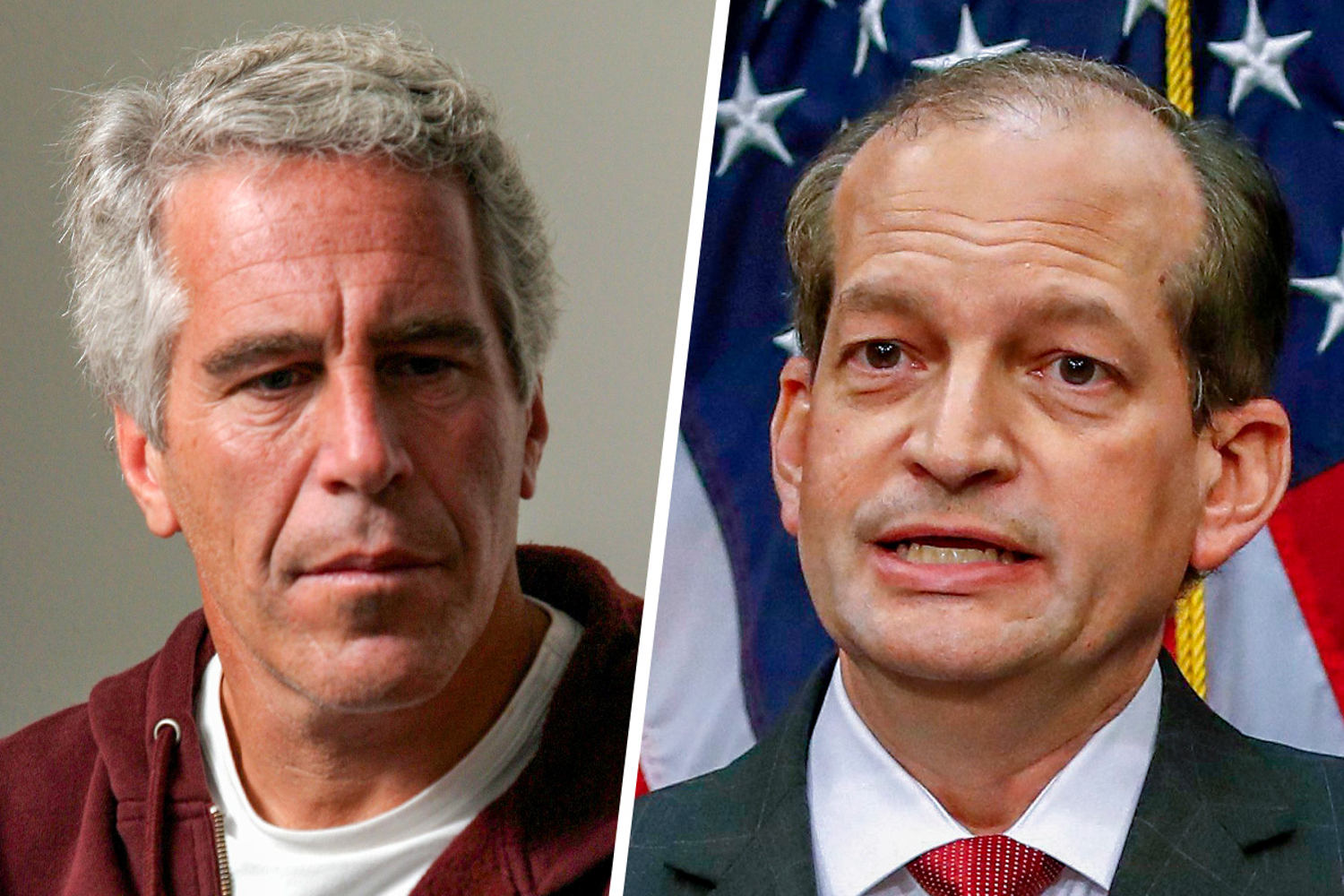
Alex Acosta, a former U.S. Attorney for the Southern District of Florida and Trump’s first labor secretary, testified Friday before the House Oversight Committee about his role in the first federal investigation into Jeffrey Epstein.
That investigation, of course, ended in 2007 with the infamous “non-prosecution agreement” in which the Justice Department promised not to charge Epstein for any crimes investigated by the DOJ and the FBI in exchange for his pleading guilty to a single state count of solicitation of prostitution and registering as a sex offender. Through that deal, Epstein ultimately served only 13 months in a county jailwhich allowed him to spend up to 12 hours a day, six days a week at his West Palm Beach office via a work-release program. Meanwhile, Epstein’s victims, as well as the general public, were left in the dark about the deal’s very existence until roughly July 2008.
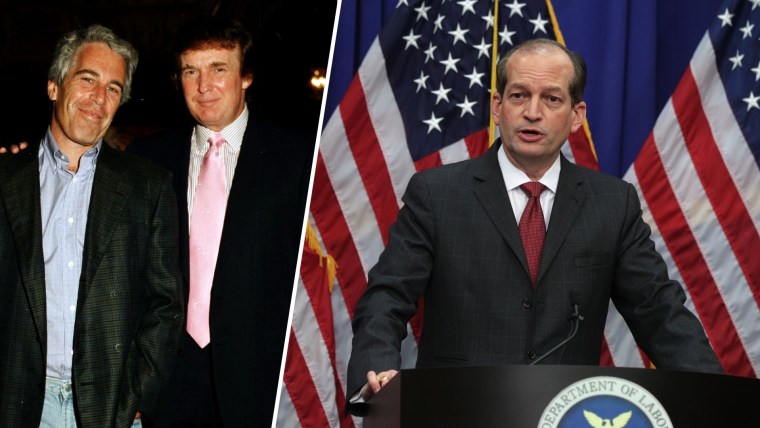
Eighteen years after that deal was signed, many people — from the survivors of Epstein’s trafficking to members of Congress — understandably still have a lot of questions for Acosta. And while I have no insight into House Oversight’s plans, I do have some pressing questions of my own, based on a review of court documents and other public records related to the Epstein investigations.
To start, this is not Acosta’s first rodeo, so to speak. In February 2019, the Justice Department’s Office of Professional Responsibility opened an investigation into possible misconduct by the five Florida federal prosecutors, including Acosta, who were involved in the Epstein deal. During that investigation, which culminated in a November 2020 report that ran to more than 300 pages, Acosta furnished OPR with written responses about his “involvement in the federal investigation of Epstein, the drafting and execution of the non-prosecution agreement, and decisions relating to victim notification and consultation” and participated in what the report describes as “extensive interviews of each subject under oath and before a court reporter.”
I’d ask Acosta why the feds played a role in negotiating victims’ ability to seek compensation.
So to ensure the veracity of his testimony, I’d first ask Acosta whether he will voluntarily provide Congress with a transcript of those prior interviews, especially given that the House Oversight Committee has received limited information that was not already in the public domain.
Second, the so-called deal of a lifetime contained terms beyond the specific charge that Epstein would plead to and how much jail time he would serve. In particular, it obligated federal prosecutors to provide Epstein with a list of his own victims to facilitate the recovery of damages by those who were minors at the time of their trafficking or abuse. In exchange, Epstein agreed to pay for victims’ lawyers, who were to be jointly selected by him and federal prosecutors, and not to contest liability to those listed victims — but only as long as their claims were limited under a particular federal statute. I’d ask Acosta why the feds played a role in negotiating victims’ ability to seek compensation, especially when they never involved the victims or their lawyers in negotiating the deal. And does Acosta understand now, in retrospect, that by identifying individuals known to the U.S. Attorney’s Office as victims, the Justice Department only further enabled Epstein to manipulate, control and even threaten those who survived his heinous crimes?
Third, the nonprosecution agreement also bound the U.S. Attorney’s Office for the Southern District of Florida not to prosecute any of Epstein’s co-conspirators, including four specifically named women who have been described as recruiters, “massage” schedulers and/or direct participants in the abuse of others. A lawyer for one of those women, Nadia Marcinkova, recently told Bloomberg that the public depiction of their client itself reflects the extent of Epstein’s depravity. “He physically, sexually, and emotionally abused, dehumanized, and completely controlled [Nadia] for years,” she said.
So I’d ask Acosta whether it occurred to him and his colleagues whether some of the girls and women accused by Epstein’s victims might themselves have been subject to his coercion and control. I’d ask whether he and his team — given the dubious credibility of Epstein’s account of events — sought to interview the women Epstein’s lawyers identified as his accomplices. Or did prosecutors see the women as, at best, willing participants — or at worst, people who, like Epstein, had serious criminal exposure?
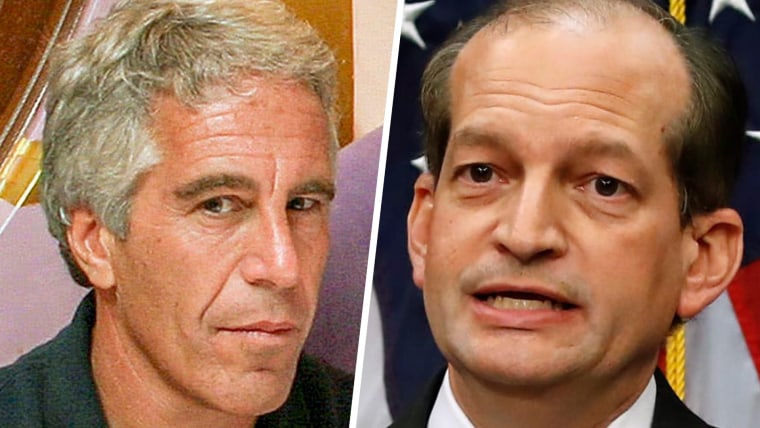
And finally, in the hope that with time and age comes some humility and a willingness to accept responsibility, I’d ask Acosta a series of more open-ended questions:
- The nonprosecution agreement specifically committed to the abrupt and premature end of the Florida-based investigation, and, in any event, it obligated the feds to lay off any potential co-conspirators. In retrospect, does Acosta regret not widening the aperture?
- At any point since 2009, has Acosta met with any of Epstein’s survivors and/or their counsel to consider his role in their ongoing trauma and pain? Does he want to say anything to them now?
- Does he know how many girls or women were sexually abused by Jeffrey Epstein after his release from jail, including during his year of house arrest, when he nonetheless traveled to New York and to his private island?
- Having apparently testified to DOJ that he had no information to indicate that Epstein was an intelligence asset, can Acosta provide any information as to why a redacted September 2008 FBI memo states Epstein has “provided information to the FBI, as agreed upon” and what that process entailed?
But perhaps the most significant question is the one we are now asking again, as President Donald Trump places unqualified loyalists throughout the DOJ and prepares to fire veteran prosecutors: When Acosta was first named by then-President George W. Bush as a 36-year-old U.S. attorney, lacking prior experience as a criminal lawyer, much less a federal prosecutor, does Acosta believe he was sufficiently prepared to do justice without fear or favor?
Lisa Rubin is an BLN legal correspondent and a former litigator. Previously, she was the off-air legal analyst for “The Rachel Maddow Show” and “Alex Wagner Tonight.”
The Dictatorship
Trump pushes Pam Bondi to pursue cases against his foes
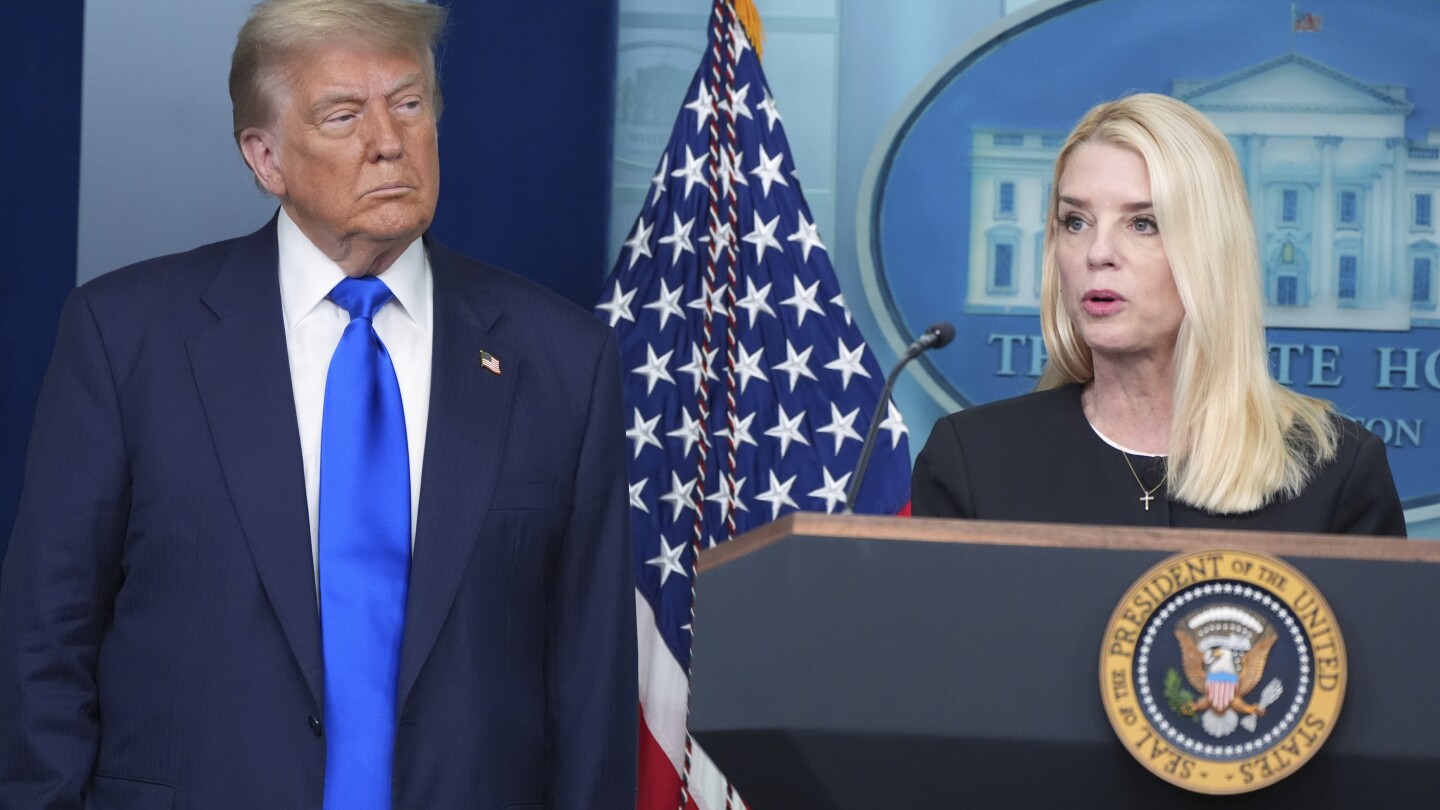
Eight months into his second term, President Donald Trump’s long-standing pledge to take on those he perceives as his political enemies has prompted debates over free speech, media censorship and political prosecutions.
From late-night comedian Jimmy Kimmel’s suspension to Pentagon restrictions on reporters and an apparent public appeal to Attorney General Pam Bondi to pursue legal cases against his adversaries, Trump has escalated moves to consolidate power in his second administration and root out those who have spoken out against him.
In a post on social media this weekend addressed to Bondi, Trump said “nothing is being done” on investigations into some of his foes.
“We can’t delay any longer, it’s killing our reputation and credibility,” he said. Noting that he was impeached and criminally charged, “JUSTICE MUST BE SERVED, NOW!!!”
Criticizing investigations into Trump’s dealings under Democratic President Joe Biden’s Justice Department, Sen. Rand Paul, R-Ky., said Sunday that “it is not right for the Trump administration to do the same thing.”
Directive to Bondi to investigate political opponents
Trump has ratcheted up his discussion of pursuing legal cases against some of his political opponents, part of a vow for retribution that has been a theme of his return to the White House. He publicly pressed Bondi this weekend to move forward with such investigations.
Trump posted somewhat of an open letter on social media Saturday to his top prosecutor to advance such inquiries, including a mortgage fraud probe into New York Attorney General Letitia James and a possible threat case against former FBI Director James Comey.
He posted that he had “reviewed over 30 statements and posts” that he characterized as criticizing his administration for a lack of action on investigations.
“We have to act fast — one way or the other,” Trump told reporters later that night at the White House. “They’re guilty, they’re not guilty — we have to act fast. If they’re not guilty, that’s fine. If they are guilty or if they should be charged, they should be charged. And we have to do it now.”
Trump later wrote in a follow-up post that Bondi was “doing a GREAT job.”
Paul, a frequent Trump foil from the right, was asked during an interview on NBC’s “Meet the Press” about the propriety of a president directing his attorney general to investigate political opponents. The senator decried “lawfare in all forms.”
Sen. Chris Murphy, D-Conn., said it was “unconstitutional and deeply immoral for the president to jail or to silence his political enemies.” He warned it could set a worrisome precedent for both parties.
“It will come back and boomerang on conservatives and Republicans at some point if this becomes the norm,” Murphy told ABC’s “This Week.”
The Senate’s Democratic leader, Chuck Schumer of New York, said on BLN’s “State of the Union” that Trump is turning the Justice Department “into an instrument that goes after his enemies, whether they’re guilty or not, and most of them are not guilty at all, and that helps his friends. This is the path to a dictatorship. That’s what dictatorships do.”
The Justice Department did not respond Sunday to a message seeking comment.
Appointment of new prosecutor in Letitia James investigation
Each new president nominates his own U.S. attorneys in jurisdictions across the country. And Trump has already worked to install people close to him in some of those jobs, including former Fox News host Jeanine Pirro in the District of Columbia and Alin Habbahis former attorney, in New Jersey.
Trump has largely stocked his second administration with loyalists, continuing Saturday with the nomination of a White House aide as top federal prosecutor for the office investigating James, a longtime foe of Trump.
Trump announced Lindsey Halligan to be the U.S. attorney in the Eastern District of Virginia on Saturday, just a day after Erik Siebert resigned from the post and Trump said he wanted him “out.”
Trump said he was bothered that Siebert had been supported by the state’s two Democratic senators.
“There are just two standards of justice now in this country. If you are a friend of the president, a loyalist of the president, you can get away with nearly anything, including beating the hell out of police officers,” Murphy said, mentioning the defendants in the Jan. 6, 2021, riot at the U.S. Capitol pardoned by Trump as he returned to office. “But if you are an opponent of the president, you may find yourself in jail.”
New restrictions on Pentagon reporters
Trump has styled himself as an opponent of censorship, pledging in his January inaugural address to “bring free speech back to America” and signing an executive order that no federal officer, employee or agent may unconstitutionally abridge the free speech of any American citizen.
Under a 17-page memo distributed Friday, the Pentagon stepped up restrictions on the mediasaying it will require credentialed journalists to sign a pledge to refrain from reporting information that has not been authorized for release, including unclassified information. Journalists who don’t abide by the policy risk losing credentials that provide access to the Pentagon.
Asked Sunday if the Pentagon should play a role in determining what journalists can report, Trump said, “No, I don’t think so.”
“Nothing stops reporters. You know that,” Trump told reporters as he left the White House for Charlie Kirk’s memorial service.
Trump has sued numerous media organizations for negative coverage, with several settling with the president for millions of dollars. A federal judge in Florida tossed out Trump’s $15 billion defamation lawsuit against The New York Times on Friday.
Jimmy Kimmel ouster and FCC warning
Perhaps the most headline-grabbing situation involves ABC’s indefinite suspension Wednesday of veteran comic Jimmy Kimmel’s late-night show. What he said about Kirk’s killing had led a group of ABC-affiliated stations to say it would not air the show and provoked some ominous comments from a top federal regulator.
Host Jimmy Kimmel speaks at the Oscars in Los Angeles on Feb. 26, 2017. (Photo by Chris Pizzello/Invision/AP, File)
Host Jimmy Kimmel speaks at the Oscars in Los Angeles on Feb. 26, 2017. (Photo by Chris Pizzello/Invision/AP, File)
Trump celebrated on his social media site: “Congratulations to ABC for finally having the courage to do what had to be done.”
Earlier in the day, the Federal Communications Commission chairman, Brendan Carrwho has launched investigations of outlets that have angered Trump, said Kimmel’s comments were “truly sick” and that his agency has a strong case for holding Kimmel, ABC and network parent Walt Disney Co. accountable for spreading misinformation.
“We can do this the easy way or the hard way,” Carr said. “These companies can find ways to take action on Kimmel or there is going to be additional work for the FCC ahead.”
Sen. Markwayne MullinR-Okla., argued that Kimmel’s ouster wasn’t a chilling of free speech but a corporate decision.
“I really don’t believe ABC would have decided to fire Jimmy Kimmel over a threat,” he said Sunday on BLN. “ABC has been a longstanding critic of President Trump. They did it because they felt like it didn’t meet their brand anymore.”
Not all Republicans have applauded the move. On his podcast Friday, GOP Sen. Ted Cruz of Texas called it “unbelievably dangerous for government to put itself in the position of saying we’re going to decide what speech we like and what we don’t, and we’re going to threaten to take you off air if we don’t like what you’re saying.”
Trump called Carr “a great American patriot” and said Friday that he disagreed with Cruz.
___
Kinnard can be reached at http://x.com/MegKinnardAP.
The Dictatorship
Hegseth imposes new press restrictions, eyes greater Pentagon control over access
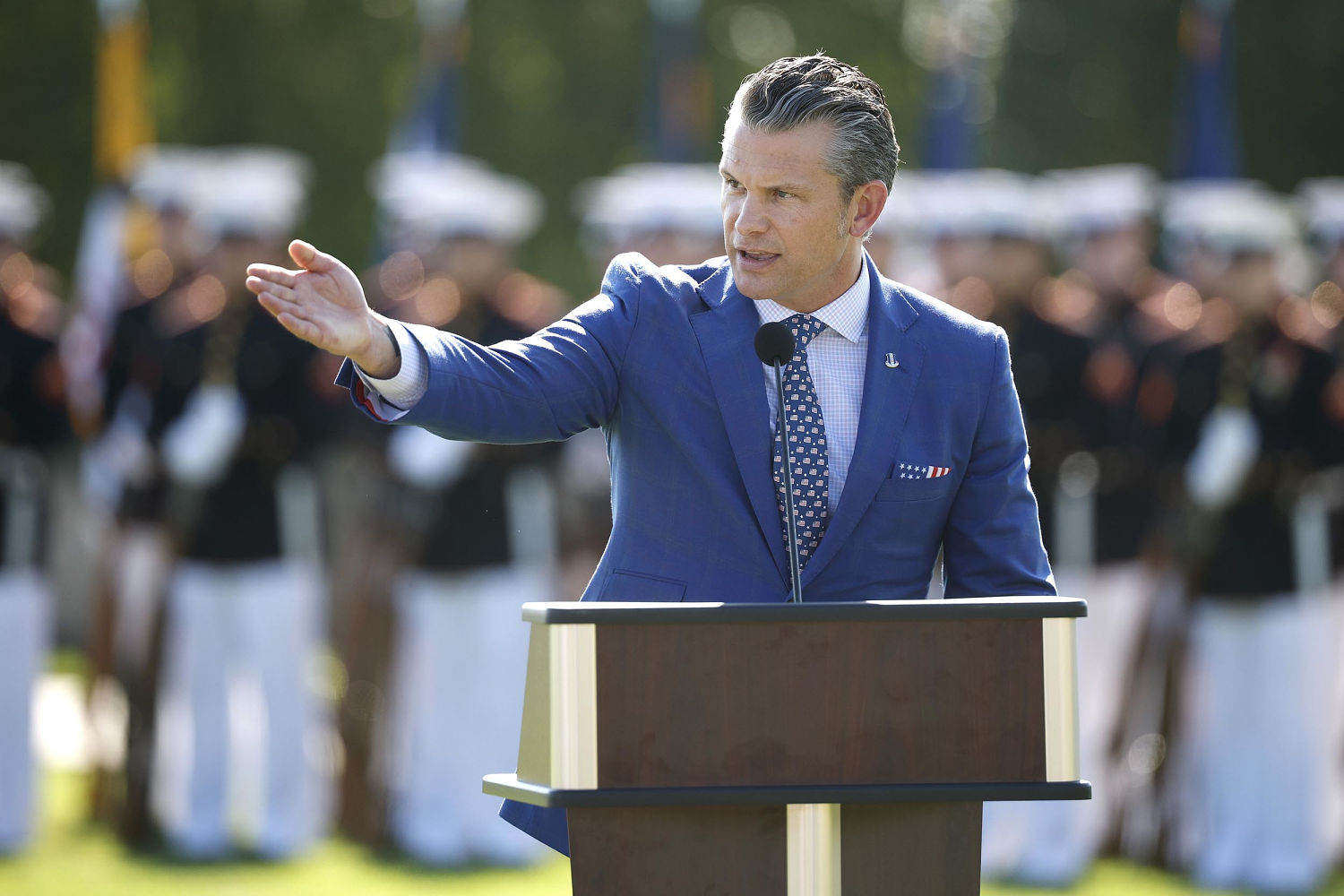
During a recent “expletive-laden address” at the Army War College, Defense Secretary Pete Hegseth boasted, “We are laser-focused on our mission of warfighting.” The former Fox News host did not, however, note that he was apparently referring to a domestic culture war.
During his tenure, the beleaguered Pentagon chief has invested a considerable amount of time and energy in library books. And paintings. And scrubbing Defense Department websites of articles and images about Jackie Robinson and the Navajo Code Talkers. And renaming Navy ships. And leading a Christian prayer service in the Pentagon’s auditorium. And amplifying videos about denying women the right to vote. And creating new grooming standards.
But in case that weren’t quite enough, Hegseth has also carved out time to push back against the industry he ostensibly worked in before joining the Trump administration: the news media.
As The Associated Press reported“The Pentagon this year has evicted many news organizations while imposing a series of restrictions on the press that include banning reporters from entering wide swaths of the Pentagon without a government escort — areas where the press had access in past administrations as it covers the activities of the world’s most powerful military.”
Late last week, these efforts took a dramatic turn for the worse. NBC News reported:
Journalists who cover the Defense Department at the Pentagon can no longer gather or report information, even if it is unclassified, unless it’s been authorized for release by the government, defense officials announced Friday. Reporters who don’t sign a statement agreeing to the new rules will have their press credentials revoked, officials said.
I’m mindful of the fact that Donald Trump and his team have launched a radical offensive against the First Amendment and its protections for the free press, but that doesn’t make the developments at the Pentagon any less ridiculous.
Sen. Jack Reed, D-R.I., a military veteran and ranking member on the Senate Armed Services Committee, called the restrictions “an ill-advised affront to free speech and freedom of the press.”
“Secretary Hegseth’s restrictions on the press are part of a broader attempt by this Administration to cover up missteps, stifle independent journalism, and obscure the truth,” Reed said. “American journalists are not, should not, and must not be mere stenographers for the party in power or the Pentagon itself.”
The senator’s use of the word “stenographers” was especially notable because it summarized the underlying problem nicely: Hegseth’s policyfor all intents and purposes, requires professional journalists to publish only what the Defense Department has approved for public release.
That might very well make the secretary happy and improve his job security — Hegseth has been humiliated in recent months from revelations that emerged from sources within the Pentagon — but this isn’t how things are supposed to work in the United States.
Even some Republicans acknowledged the absurdity of the demand.
Rep. Don Bacon of Nebraska, whose looming retirement seems to have made it easier for the congressman to speak candidly, wrote online“This is so dumb that I have a hard time believing it is true. We don’t want a bunch of Pravda newspapers only touting the Government’s official position. A free press makes our country better. This sounds like more amateur hour.”
Whether the pushback prompts a change in direction remains to be seen. Watch this space.
Steve Benen is a producer for “The Rachel Maddow Show,” the editor of MaddowBlog and an BLN political contributor. He’s also the bestselling author of “Ministry of Truth: Democracy, Reality, and the Republicans’ War on the Recent Past.”
The Dictatorship
Why Trump’s directive to AG Bondi should be seen as an impeachment-level scandal
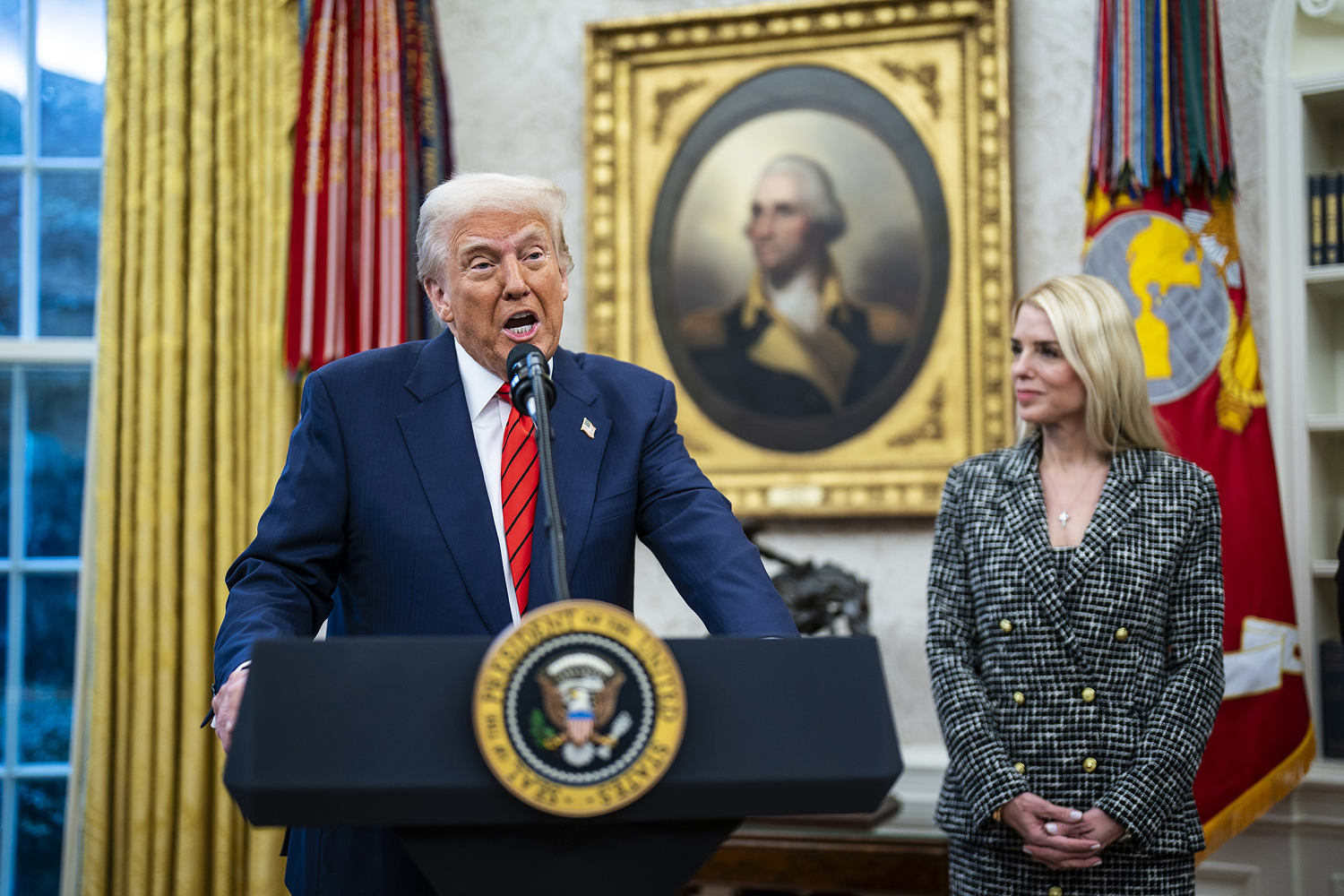
Imagine a scenario in which an investigative reporter uncovered a secret document from the White House. The document, in this hypothetical, showed Donald Trump quietly directing his attorney general to manufacture criminal cases against his political foes, without regard for evidence or propriety, as part of a brazenly corrupt and overtly authoritarian scheme.
In this scenario, the investigative reporter who obtained this secret document would, in a normal and healthy democracy, have a scoop for the ages. The public exposure of such a document would instantly become the kind of story that would rock the political system, spark heated congressional hearings and generate questions about possible resignations.
But in 2025, there’s apparently no need for an investigative reporter to uncover a clandestine plot — because the president published his scheme online for all the world to see. The New York Times reported:
President Trump demanded on Saturday that his attorney general move quickly to prosecute figures he considers his enemies, the latest blow to the Justice Department’s tradition of independence. ‘We can’t delay any longer, it’s killing our reputation and credibility,’ Mr. Trump wrote in a social media post addressed to ‘Pam,’ meaning Attorney General Pam Bondi.
The online missive was head-spinning in its absurdity. Trump began his message, “I have reviewed over 30 statements and posts saying that, essentially, ‘same old story as last time, all talk, no action. Nothing is being done. What about Comey, Adam ‘Shifty’ Schiff, Leticia??? They’re all guilty as hell, but nothing is going to be done.’”
In other words, to hear the president tell it, he saw some “posts” from unnamed people who want some of Trump’s political adversaries to be punished, because they’re “guilty” of unidentified crimes, and these “posts” should necessarily spur action from the Justice Department, because the president said so.
Concluding that “they” impeached him and tried to hold him accountable for a variety of alleged felonies, the Republican concluded that he’s desperate to turn the tables on his enemies. “JUSTICE MUST BE SERVED, NOW!!!” he wrote.
In case that was too subtle, Trump spoke briefly with reporters soon after, one of whom asked whether he was criticizing Bondi for not having already gone after his domestic adversaries. “No, I just want people to act,” the president replied. “They have to act, and we want to act fast. … We have to act fast.”
The Times’ report added, “Even for a president who has shattered the traditional norms of maintaining distance from the Justice Department, Mr. Trump’s unabashedly public and explicit orders to Ms. Bondi were an extraordinary breach of prosecutorial protocols that reach back to the days following the Watergate scandal.”
The Watergate reference is notable in large part because it helps contextualize the gravity of the circumstances: Trump isn’t just being accused of trying to weaponize federal law enforcement, he’s publicly flaunting his efforts.
His online directive was, for all intents and purposes, a confession in which he freely acknowledged his guilt. “Yes, I admit that I’m pressuring my attorney general to prosecute my political foes,” the president effectively declared. “And I’d prefer it if she hurried up and satisfied my hunger for revenge sooner rather than later.”
There’s no precedent in the American tradition for such explicit corruption of the rule of law. It is the stuff of impeachment resolutions. It is a brazen display of a desperate man who believes he’s both above the law and freed from the burdens of accountability.
Steve Benen is a producer for “The Rachel Maddow Show,” the editor of MaddowBlog and an BLN political contributor. He’s also the bestselling author of “Ministry of Truth: Democracy, Reality, and the Republicans’ War on the Recent Past.”
-
Uncategorized10 months ago
Bob Good to step down as Freedom Caucus chair this week
-

 The Josh Fourrier Show11 months ago
The Josh Fourrier Show11 months agoDOOMSDAY: Trump won, now what?
-

 Politics7 months ago
Politics7 months agoFormer ‘Squad’ members launching ‘Bowman and Bush’ YouTube show
-

 The Dictatorship7 months ago
The Dictatorship7 months agoPete Hegseth’s tenure at the Pentagon goes from bad to worse
-

 Politics11 months ago
Politics11 months agoWhat 7 political experts will be watching at Tuesday’s debate
-

 The Dictatorship7 months ago
The Dictatorship7 months agoLuigi Mangione acknowledges public support in first official statement since arrest
-

 Politics11 months ago
Politics11 months agoHow Republicans could foil Harris’ Supreme Court plans if she’s elected
-

 Politics7 months ago
Politics7 months agoBlue Light News’s Editorial Director Ryan Hutchins speaks at Blue Light News’s 2025 Governors Summit




